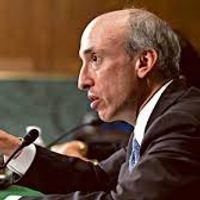In a recent interview, Gerard Scimeca, co-founder and chairman of Consumer Action for a Strong Economy (CASE), expressed growing concerns about the actions of the U.S. Securities and Exchange Commission (SEC) and its chairman, gary gensler

 gary gensler Gary Gensler is the chairman of the U.S. Securities and Exchange Commission (SEC). His studies in finance and blockchain at MIT have helped him develop U.S. cryptocurrency regulations and policies.
Quick Facts Full name Gary Scott Gensler Birth 18-10-1957, Baltimore, Maryland, United States Nationality American Education MBA from the University of Pennsylvania Marital status Married to Francesca Danieli (1986-2006) Net worth Estimated $100 million
Gensler has advocated for enhanced supervision of digital assets, seeking to regulate cryptocurrencies similar to securities. His work at the SEC has focused on safeguarding investors, regulating crypto exchanges, and establishing stablecoin policies.
Gary Gensler - Career Highlights 1997 – Became Assistant Secretary of the Treasury.
2009 – Led CFTC, regulating financial derivatives post-2008 crisis.
2018 – Taught blockchain and crypto at MIT.
2021 – Appointed SEC Chairman, focusing on crypto regulations.
2022 – Proposed stricter rules for crypto exchanges.
2023 – Took legal action against major crypto firms.
2024 – Advocated for stronger stablecoin and DeFi regulations.
Gary has collaborated with multiple lawmakers in formulating crypto policies. Even with disagreements with crypto investors regarding crypto policies, he continues to be a key player in the changing dynamic between regulatory frameworks and blockchain advancement.
Awards & Recognitions of Gary Gensler Year Institution Description 2009 U.S. Treasury Financial Regulation Leader 2018 MIT Blockchain & Crypto Educator 2021 SEC SEC Chairman Overseeing Crypto Policies 2023 Bloomberg Most Influential Regulator in Crypto 2024 Forbes Top Policy Maker in Digital Assets
Useful Links to Connect With Gary Gensler Platform Link X (formerly Twitter) twitter.com/GaryGensler CFTC website Chairman Gary Gensler Chairman , in the crypto industry.
gary gensler Gary Gensler is the chairman of the U.S. Securities and Exchange Commission (SEC). His studies in finance and blockchain at MIT have helped him develop U.S. cryptocurrency regulations and policies.
Quick Facts Full name Gary Scott Gensler Birth 18-10-1957, Baltimore, Maryland, United States Nationality American Education MBA from the University of Pennsylvania Marital status Married to Francesca Danieli (1986-2006) Net worth Estimated $100 million
Gensler has advocated for enhanced supervision of digital assets, seeking to regulate cryptocurrencies similar to securities. His work at the SEC has focused on safeguarding investors, regulating crypto exchanges, and establishing stablecoin policies.
Gary Gensler - Career Highlights 1997 – Became Assistant Secretary of the Treasury.
2009 – Led CFTC, regulating financial derivatives post-2008 crisis.
2018 – Taught blockchain and crypto at MIT.
2021 – Appointed SEC Chairman, focusing on crypto regulations.
2022 – Proposed stricter rules for crypto exchanges.
2023 – Took legal action against major crypto firms.
2024 – Advocated for stronger stablecoin and DeFi regulations.
Gary has collaborated with multiple lawmakers in formulating crypto policies. Even with disagreements with crypto investors regarding crypto policies, he continues to be a key player in the changing dynamic between regulatory frameworks and blockchain advancement.
Awards & Recognitions of Gary Gensler Year Institution Description 2009 U.S. Treasury Financial Regulation Leader 2018 MIT Blockchain & Crypto Educator 2021 SEC SEC Chairman Overseeing Crypto Policies 2023 Bloomberg Most Influential Regulator in Crypto 2024 Forbes Top Policy Maker in Digital Assets
Useful Links to Connect With Gary Gensler Platform Link X (formerly Twitter) twitter.com/GaryGensler CFTC website Chairman Gary Gensler Chairman , in the crypto industry.
In an interview with Thinking Crypto, Scimeca highlighted the complexity of the issues surrounding the SEC’s recent legal battles, including the Ripple lawsuit and the appeals court ruling against the SEC in the Grayscale Bitcoin spot ETF case. He also questioned the SEC’s pursuit of Coinbase, a company it had previously greenlighted to go public.
The conversation touched upon the lack of clear guidelines in the crypto space, with Scimeca suggesting that the SEC’s actions appear arbitrary and capricious. He raised questions about the agency’s priorities, noting meetings between SEC officials and Gary Gensler with Celsius and FTX, while other actions target companies that seem to be compliant.
He said, “I think this is one of those issues that warranted it, yeah, because there’s so many layers to this. Going back to the Ripple lawsuit, the SEC just lost to Grayscale in the appeals court, and those judges said the SEC was arbitrary and capricious in not approving Grayscale’s Bitcoin spot ETF. And now they’re going after Coinbase, a company they greenlighted to go public years ago. So it just seems like a mess.”
He continued, “You have these things happening in parallel while, on the other hand, where was the SEC for Celsius and FTX? I mean, there is documented evidence that SEC and Gary Gensler met with officials of FTX multiple times. So what’s happening? It’s just a failure to do your job.”
The discussion also highlighted the challenges of regulating a relatively new industry and the need for lawmakers to provide a clear framework for crypto businesses. Scimeca emphasized the importance of clear rules to prevent a market freeze and encourage innovation.
Scimeca suggested that Gensler’s approach might be rooted in a form of territorial power, where flaunting authority prompts the SEC to make an example of companies or individuals. Gensler’s lack of clear communication and the absence of a coherent framework for the crypto industry were emphasized as significant concerns.








